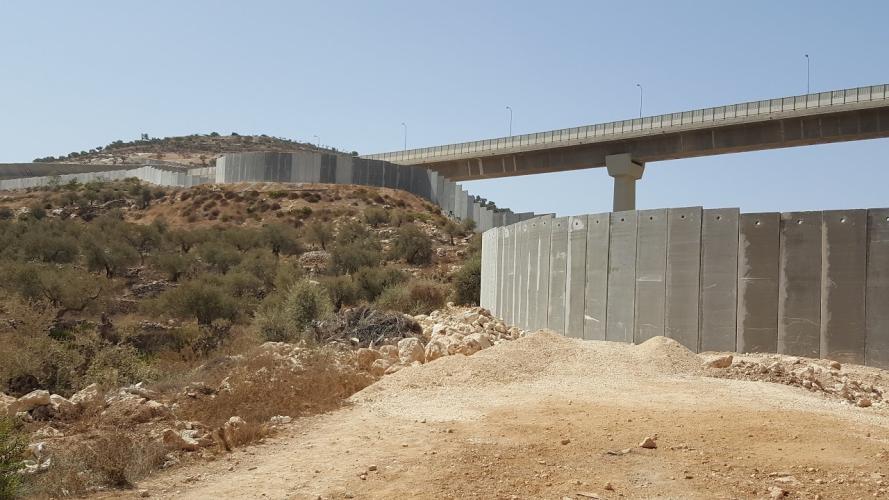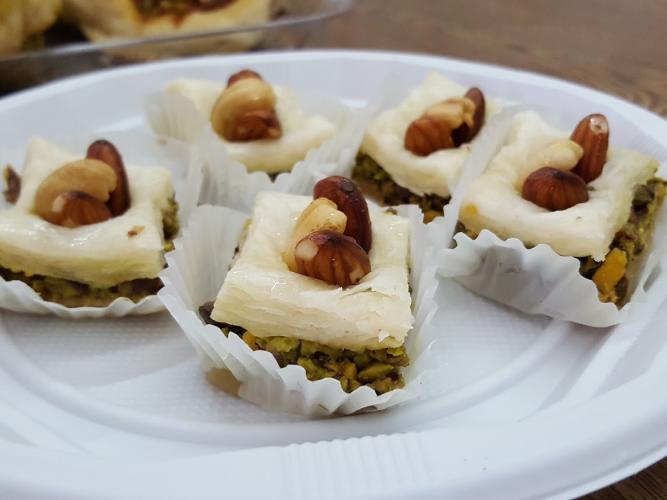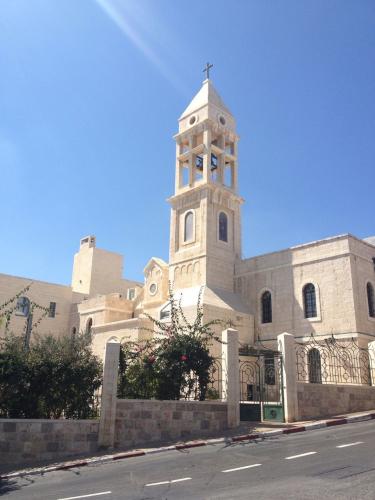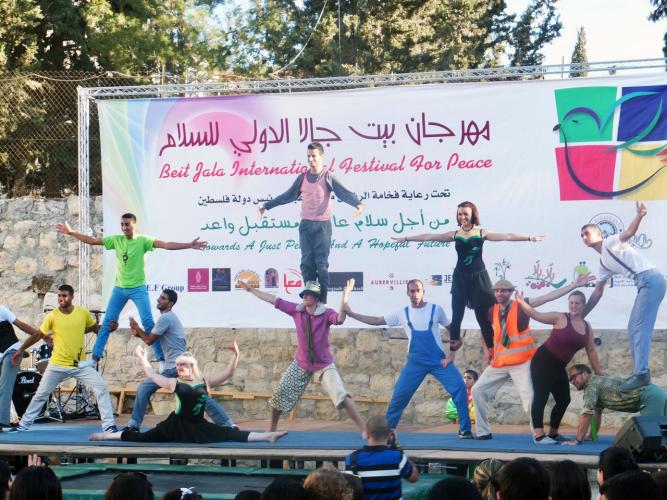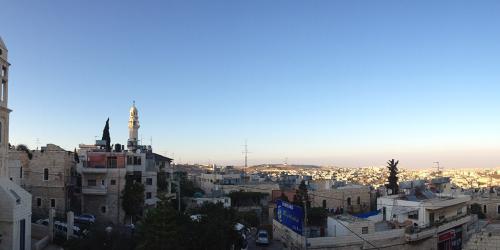
Beit Jala, Palestine
Origin of the partnership
The city of Jena has been twinned with Beit Jala since September 2011. The contacts to Beit Jala originated in the cooperation with our French twin city Aubervilliers, whose twin city Beit Jala is already since 1997.
This trilateral relationship mainly involves project work, which was established in a cooperation agreement in December 2008.
Geography and society
The Palestinian city is located 2 km east of Bethlehem and 10 km south of Jerusalem, in the territory of the West Bank. Beit Jala is characterized by its hilly location and is on average at an altitude of 758 m.
The first settlements in what is now Beit Jala, were probably established as early as 3000 BC and were home to the Canaanite people. Today Beit Jala, which was declared a city in 1912 and whose name means "grass carpet" in Aramaic, has about 17,500 inhabitants. Of these, about 60% are Christians and 40% are Muslims. By law, the mayor of the city must be of Christian denomination.
There are also around 100,000 people living abroad - especially in Argentina and Chile - who originally came from Beit Jala.
Education and culture
There are three public and six private schools, run by religious institutions, in Beit Jala. Another educational institution is sponsored by the United Nations Relief and Works Agency for Palestine Refugees.
Higher education is provided by a university, the Al Quds Open University, as well as a vocational school and the Bethlehem Music Academy.
The offer is supplemented by two church schools, which, for example, provide training in hotel management. One of these is the Talitha Kumi School, which is run by Germans and also leads to a high school diploma that is recognized in Germany.
The cityscape of Beit Jala is characterized by its five churches and two mosques, which illustrate the importance of religion in the Palestinian city.
Roman, Byzantine and Islamic ruins also bear witness to the area's eventful and long history.
Economy and Tourism
An important sector of Beit Jala's economy is agriculture. Olives, apricots and wine are grown. The largest vineyard in the country is the Salesian monastery of Cremisan.
In addition, building blocks, textiles, furniture, medicines as well as cigarettes are produced. Industry employs about 25% of the workforce, trade 25%, and services 30%.
About a quarter of Beit Jala's population is unemployed. The overall difficult economic situation as well as the poor standard of living of the population are a consequence of the separation wall, which blocks an exchange with Israel.
Due to the turbulent political situation in the country, it is also difficult to promote tourism in the region. Nevertheless, Beit Jala offers worthwhile excursion destinations for visitors. The Greek Orthodox Church of St. Nicolas and the Beit Jala Al Kabeer Mosque are particularly impressive. Two theaters, the Bethlehem Museum, and several shooping centers can also be visited.
The Talitha Kumi School or Abraham's Hostel offer comfortable accommodation.
Relations between Palestine and Germany
The Federal Republic of Germany supports the Palestinian Autonomous Territories. There is cooperation in the fields of economics, education, science and development aid. Germany supports the two-state solution in the West Bank and the Gaza Strip, but also advocates internal Palestinian peace and the right of a Jewish, democratic State of Israel to exist.
Since 2008, there have been regular government consultations at which problems relating to water supply and waste management in Palestine are discussed in particular.
A Goethe-Institut and the German-French Cultural Centre are based in Ramallah. Several partnerships between German and Palestinian universities promote the exchange of young students and cooperation in joint research projects.
Project selection
The annual peace and cultural festival in Beit Jala forms a central link in the cooperation between the two twin cities.
The Jena Circus MOMOLO actively participated in the 2017 festival with the help of four artists and a coordinator. Together with the Palestinian Circus School, several workshops were held where, for example, acrobatics and juggling performances could be trained. After several rehearsals and a circus performance by the friendly circus from Hebron, the artists of Circus MOMOLO and the Palestinian Circus School finally performed a one-hour show on the evening of 09.11.2017. The more than 1000 visitors of the festival were enthusiastic throughout.
With the director of the Al Harah Theater in Beit Jala, there were also agreements on future cooperation and projects to continue to promote cultural exchange and strengthen the partnership between Jena and its twin city.
Of course, the project was financially supported by the Saalestadt, which gave the corresponding order.
In April 2017, there was also a youth education trip by Jena football fans to Israel and the Palestinian autonomous region. In Beit Jala, for example, they visited the artificial turf pitch that was created with the help of Jena and Bergisch-Gladbach, another of Beit Jala's German partner cities. On the occasion of the trip, a complete team set of football jerseys of FC Carl Zeiss Jena was donated to the chirstliche"Hope-School".
Geografie und Gesellschaft
Die palästinensische Stadt befindet sich 2 km östlich von Bethlehem und 10 km südlich von Jerusalem, im Gebiet des Westjordanlandes. Beit Jala ist von seiner Hügellage geprägt und befindet sich durchschnittlich auf einer Höhe von 758 m.
Die ersten Siedlungen im heutigen Beit Jala, entstanden wahrscheinlich bereits 3000 v.Chr. Und beherbergten das Volk der Kanaaiter. Heute hat Beit Jala, welches 1912 zur Stadt erklärt wurde und dessen Name "Grasteppich" im Aramäischen bedeutet, rund 17.500 Einwohner. Davon sind ca. 60 % Christen und 40 % Muslime. Laut Gesetz muss der Bürgermeister der Stadt christlicher Konfession sein.
Auch im Ausland - besonders in Argentinien und Chile - leben um die 100.000, ursprünglich aus Beit Jala stammende Menschen.
Bildung und Kultur
Es gibt drei öffentlich und sechs private Schulen, die von religiösen Einrichtungen getragen werden, im Stadtgebiet Beit Jalas. Eine weitere Bildungseinrichtung wird vom "Hilfswerk der Vereinten Nationen für Palästina-Flüchtlinge" getragen.
Die Hochschulbildung wird ermöglicht durch eine Universität, die Al Quds Open University sowie eine Berufsschule und die Bethlehem Musik-Akadamie.
Ergänzt wird das Angebot durch zwei kirchliche Schulen, die zum Beispiel eine Ausbildung im Hotelfach ermöglichen. Eine davon ist die Talitha-Kumi-Schule in deutscher Trägerschaft, die auch zu einen, in Deutschland anerkannten, Abitur führt.
Das Stadtbild Beit Jalas ist geprägt durch seine fünf Kirchen und zwei Moscheen, die die Bedeutung der Religion in der palästinensischen Stadt verdeutlichen.
Römische, byzantische und islamische Ruinen zeugen außerdem von der bewegten und langen Geschichte des Gebietes.
Wirtschaft und Tourismus
Ein wichtiger Wirtschaftssektor Beit Jalas ist die Landwirtschaft. Es werden Oliven, Aprikosen und Wein angebaut. Das größte Weingut des Landes ist das Salesianerkloster Cremisan.
Außerdem werden Bausteine, Textilien, Möbel, Medikamente sowie Zigaretten hergestellt. In der Industrie sind ca. 25 % der Beschäftigten tätig, 25 % im Handel und 30 % im Dienstleistungssektor.
Ungefähr ein Viertel der Bevölkerung Beit Jalas ist arbeitslos. Die insgesamt schwierige wirtschaftliche Situtation sowie der schlechte Lebensstandard der Bevölkerung sind Folge der Trennungsmauer, welche einen Austausch mit Israel blockiert.
Aufgrund der turbulenten politischen Verhältnisse im Land, ist es auch schwer den Tourismus in der Region zu fördern. Nichtsdestotrotz bietet Beit Jala lohnende Ausflugsziele für Besucher. Besonders eindrucksvoll ist die griechisch-orthodoxe Kirche St. Nicolas sowie die Beit Jala Al Kabeer Moschee. Auch zwei Theater, das Bethlehem Museum sowie einige Shooping-Center können besucht werden.
Die Talitha Kumi Schule oder Abrahams Herberge bieten komfortable Unterbringungen.
Beziehung Palästina zu Deutschland
Die Bundesrepublik unterstützt die palästinensischen Autonomiegebiete. Es besteht Zusammenarbeit in Bereichen der Wirtschaft, Bildung, Wissenschaft und Entwicklungshilfe. Deutschland unterstützt die Zwei-Staaten-Lösung im Westjordanland und dem Gaza-Streifen, plädiert aber auch für eine inner-palästinensische Befriedung und das Existenzrecht eines jüdischen, demokratisches Staates Israel.
Seit 2008 gibt es regelmäßig stattfindende Regierungskonsultationen, bei denen besonders Probleme rund um Wasserversorgung und Abfallmanagement in Palästina besprochen werden.
In Ramallah haben ein Goethe-Institut und das Deutsch-Französsiche Kulturzentrum ihren Sitz. Etliche Partnerschaften zwischen deutschen und palästinensischen Hochschulen fördern den Austausch von jungen Studierenden und Kooperationen bei gemeinsamen Forschungsprojekten.
Projektauswahl
Das jährlich stattfindende Friedens-und Kulturfest in Beit Jala bildet einen zentralen Anknüpfungspunkt in der Zusammenarbeit der beiden Partnerstädte.
Der Jenaer Circus MOMOLO gestaltete das Fest 2017 mithilfe von vier Artisten und einer Koordinatorin tatkräftig mit. Gemeinsam mit der Palestinian Circus School wurde mehrere Workshops durchgeführt, bei denen zum Beispiel Akrobatik und Jonglage-Einlagen trainiert werden konnten. Nach etlichen Proben und einer Zirkusvorstellung des befreundeten Zirkus aus Hebron kam es am Abend des 09.11.2017 schließlich zur einstündigen Show der Artisten des Circus MOMOLO und der Palestinian Circus School. Die über 1000 Besucher des Festivals waren durchweg begeistert.
Im April 2017 fand außerdem eine Jugendbildungsreise von Jenaer Fußballfans nach Israel und ins palästinensische Autonomiegebiet statt. In Beit Jala wurde zum Beispiel der Kunstrasenplatz besucht, der mit Hilfe Jenas und Bergisch-Gladbachs, einer weiteren deutschen Partnerstadt Beit Jalas, geschaffen werden konnte. Der chirstlichen "Hope-School" wurde anlässlich der Reise ein kompletter Mannschaftssatz von Fußballtrikots des FC Carl Zeiss Jena geschenkt.

